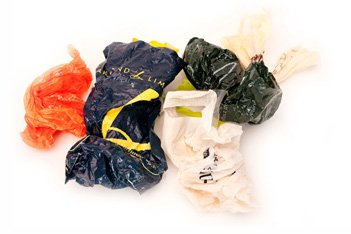Scottish bag levy will save £90m, new report finds

A new report from the Scottish Government has found that despite initial and annual costs to key players, new carrier bag charges to be implemented in October 2014 could yield savings of around £90 million, compared with ‘doing nothing’.
The introduction of the single-use carrier bag charge is intended to reduce waste and achieve greater reuse of bags, by requiring that all retailers charge a minimum of five pence per carrier bag, irrespective of the material.
The report, ‘Partial Business and Regulatory Impact Assessment: Carrier Bag Charge’, published last month (July 2013), aims to consider the relative costs and benefits of the impending bag charge to customers, retailers, government and the environment.
‘Benefits balance potential impacts’
The Scottish Government calculated that ’the carrier bag charge yields a net benefit of around £90 million over the forecast period’ of 15 years, after accounting for the individual impacts for all players.
As a result of the charge, the reduction in the use of carrier bags is expected to reduce overall costs to the environment by £11 million per annum.
The government liaised with colleagues in Wales whilst writing the report, to learn from their implementation of the legislation in 2010. Based on the Welsh impact assessment, they expect one-off costs to retailers ’to amount to £1.7 million of set-up costs to alter till-points to process and itemise the charge on receipts, train staff and communicate changes’.
From then on, the report estimates ‘annual costs to retailers of keeping records and reporting back are estimated at £1.5 million’. However, the scheme is intended to be ‘cost-neutral’ to retailers, whereby these costs are covered by the proceeds of the new charges, and the remainder is donated to charitable and environmental good causes.
Customers stand to lose the convenience of ‘free’ bags at the checkout, if they are unwilling to pay the charge. The report estimates this convenience charge ’to be around £14 million per annum.’
However, the reduction in single-use bags used will also reduce the ‘hidden’ costs incurred by the retailer in procuring the bags, which pass through to retail customers in its entirety. The customer benefit of no longer paying these ‘hidden’ costs will reportedly amount to £11 million.
One-off costs to the Scottish Government are estimated at £1 million, through advertising and communication, introducing the legislation and preparatory work on enforcement, based on the same costs to the Welsh Government for introducing the bag charge. Additional annual costs are estimated at a further £1 million.
On balance, the report finds that the bag charge will trigger a reduction in costs, compared with the baseline ‘do nothing’ approach that would cost £600 million over the forecast period.
England yet to introduce bag levy
Scotland is introducing the charge in October 2014, as part of its Zero Waste Plan ’to reduce the local and global impact of [its] consumption and production’.
This follows on from news that Northern Ireland is proposing to double its carrier bag levy to 10 pence by April 2014, and extend the charge to other types of bags.
According to data from the Waste and Resources Action Programme (WRAP), Wales’s plastic bag levy (launched in 2011) has led to a dramatic decrease in the number of single-use bags issued, with 2012 seeing a 76 per cent reduction in carrier bag use on the year before.
England is now the only member of the UK to not have a plastic bag levy, despite 56 per cent of people saying they were in favour of one. Indeed, WRAP found England to have seen the largest increase in the amount of single-use bags issued in 2012 (4.4 per cent), amounting to a total of 7.06 billion bags (up from 6.77 billion in 2011). In comparison, the Scottish levy is hoped to reduce the 750 million bags used in Scotland each year.
According to the BBC, a spokesman for Scottish minister Richard Lochhead said: “Our analysis suggests carrier bag charging will actually save Scotland an estimated £7 million a year and benefit the Scottish economy by about £90 milion over the forecast period.
"Our assessment indicates that the wider economic benefits of this policy will balance out the potential impacts on carrier bag suppliers.
"Almost all bags used in Scotland are imported, but we are committed to working with the small number of businesses who may be affected, to help them diversify into other product areas and the implementation timeframe will give them plenty time to adapt.
"And evidence from Ireland suggests that most companies there already supplied other packaging and were able to diversify swiftly after their charge was introduced."
Read the ‘Partial Business and Regulatory Impact Assessment: Carrier Bag Charge’ report.






